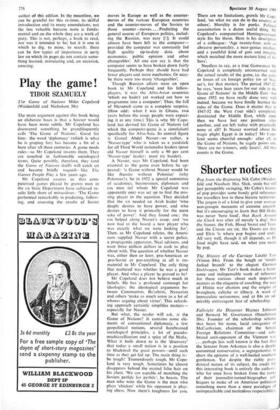Play the game!
TIBOR SZAMUELY
The Game of Nations Miles Copeland (Weidenfeld and Nicholson 50s) The main argument against this book being an elaborate hoax is that a hoaxer would have been more subtle. Mr Copeland has discovered something he grandiloquently calls 'The Game of Nations'. Good for him: the word 'diplomacy' (which is what he is groping for) has become a bit of a bore after all these centuries. A game needs rules—so Mr Copeland invents them. They are couched in fashionable sociological terms. Quite possibly, therefore, they (and the Game of Nations itself) will catch on and become briefly voguish—like The Games People Play a few years ago.
Mr Copeland assures us that corn- puterised games played by grown men in the us State Department have achieved re- sults little short of miraculous: 'The Game performed remarkably in predicting, follow- ing, and assessing the results of Soviet
moves in Europe as well as the counter- moves of the various European countries and the counter-moves of the Soviets to those counter - moves.... Predicting the general course of European politics, includ- ing the Russian, was easy [1]. It could almost have been left to the computer— provided the computer was constantly fed high quality up-to-date data about economics, public opinion and other changeables'. All one can say is that the computer seems to have broken down fairly frequently. Perhaps they should have had fewer players and more mechanics. Or may- be there were too many thangeables'.
Though Russian affairs were an open book to Mr Copeland and his fellow- players, it was the Afro-Asian countries 'which we hadn't yet worked out how to programme into a computer'. Thus, the fall of Nlcrumah came as a complete surprise. (How odd: when I was in Ghana, two years before the coup, people were expect- ing it at any time.) This is why Mr Cope- land has devised his Game of Nations (of which the computer-game is a simulation) specifically for Afro-Asia. Its central figure is Gamal Abdel Nasser—or rather, a Nasser-type' who is taken as a yardstick for all Third World nationalist leaders (poor old Nasser himself is only a 90 per cent Nasser-type' leader: must try harder).
A Nasser, says Mr Copeland, had been essential to the game even before he ap- peared: 'a Game without Nasser would be like Hamlet without Polonius' (why Polonius?). So in 1952 a special committee of academics, businessmen, diplomats and CIA men (of whom Mr Copeland was apparently one) was set up to find the mis- sing player in the equation. They decided that the us needed an Arab leader 'who deeply desires to have power, and who desires to have it primarily for the mere sake of power'. And they found one: the CIA helped along Nasser's coup, and 'we now had at the board a new player who was exactly what we were looking for'. Then, as Mr Copeland relates, the Ameri- cans supplied Nasser with a secret police, a propaganda apparatus, Nazi advisers, and even three million dollars in cash to play about with. The question of whether Nasser was, either then or later, pro-American or pro-Soviet or pro-anything at all is im- material to Mr Copeland. The only thing that mattered was whether he was a good player. And what a player he proved to be!
Mr Copeland does not believe much in beliefs. He has a profound contempt for ideologies; the ideological arguments be- tween Communists, Ba'athists, Nasserists and others 'make as much sense as a lot of whores arguing about virtue'. This refresh- ing approach certainly simplifies matters— especially for Nasser.
But what, the reader will ask, is the Game of Nations? It contains some ele- ments of conventional diplomacy, a few geopolitical notions, several harebrained sociological principles, a lot of pseudo- machiavellianism and a spice of the Mafia. What it boils down to is the 'discovery' that today a small nation is in a position to blackmail the great powers--until such time as they get fed up. The main thing is: be tough! Tremendously tough. Mr Cope- land is very tough. Sometimes he almost disappears behind the matted false hair on his chest. 'We are capable of matching the Soviets perfidy for perfidy', he boasts. The man who wins the Game is the man who plays 'chicken' while his opponent is play- ing chess. Now there's toughness for you. There are no limitations, growls Mr Cope. land, 'on what we can do in the country of others'. Morality is for punks. Political assassination is a damn useful thing. sir Copeland's computerised Hemingwayesque style fits his thesis. Here is his description of a colleague: 'Age twenty-four, with an abrasive personality, a near-genius intellect, and a youthful kind of guts and integrity which matched the more mature kind of his boss'.
Needless to say, as a true Gamesman Mr Copeland is completely unconcerned with the actual results of the game, i.e. the gains or losses of us foreign policy (or of Nas- ser's, for that matter). The period 1947-51. he says, 'were lean years for our side in the Game of Nations' in the Middle East—but since 1952 we have really done very well indeed, because we have finally learned the rules of the Game. Does it matter that in 1947-52 the West ('our side') completely dominated the Middle East, while since then we have lost one position after another, and are left today with practically none at all? Is Nasser worried about the tragic plight Egypt is in today? Mr Cope- land seems cheerful enough: after all, in the Game of Nations, he sagely points out. 'there are no winners, only losers'. All that counts is the Game.


































 Previous page
Previous page